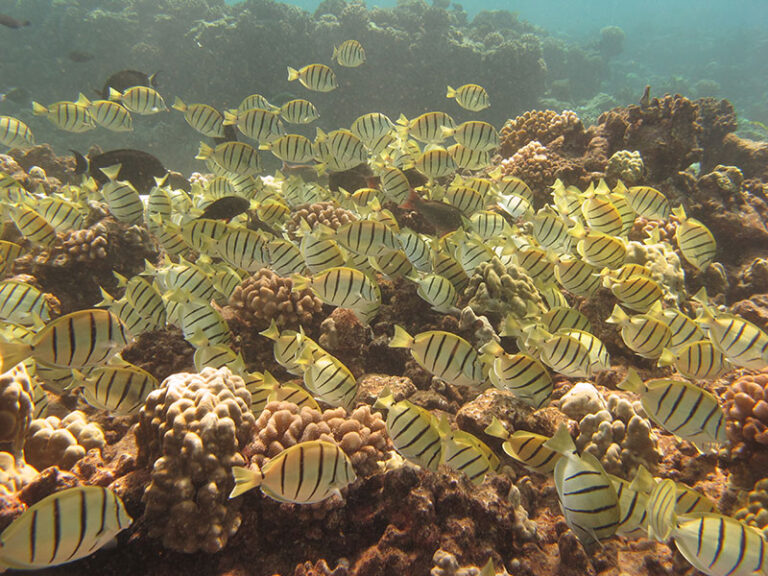Next week the council will weigh whether it should stop a legal appeal from reaching the U.S. Supreme Court.
Honolulu Civil Beat, August 30, 2019
By Nathan Eagle
Environment
Maui County Council members are expected to decide Tuesday if they want to go against Mayor Michael Victorino and settle a major Clean Water Act case instead of letting a conservative-leaning U.S. Supreme Court decide it in November.
The four environmental groups that brought the lawsuit delivered petitions this week with more than 15,000 signatures to Council Chair Kelly King. They are urging the council to step in now so it can spare the county — and the country — from an unfavorable judgment.
The Hawaii Wildlife Fund, Sierra Club-Maui Group, Surfrider Foundation and West Maui Preservation Association sued in 2012 after trying for years to reach an agreement with the county over its Lahaina wastewater reclamation facility, which has been releasing treated water into the ground that ends up entering the ocean and harming coral reefs.
District and appeals courts have ruled that the county needs a National Pollutant Discharge Elimination System permit for the facility, which handles about 3 million to 5 million gallons of sewage a day. It serves about 40,000 people.
But Victorino is fighting that decision and has succeeded in getting the case before the U.S. Supreme Court.
Environmentalists are concerned that the court’s decision would gut the Clean Water Act, a situation that would have implications far beyond Hawaii.
“This case is being closely and eagerly watched by some of the worst polluters in the country,” Earthjustice attorney Mahesh Cleveland said in a statement. “The loophole the County seeks would allow industrial and municipal polluters to evade regulation under the Clean Water Act simply by moving their discharges just short of the shores of navigable waters, or disposing of pollutants via groundwater.”
The environmental groups want the county to instead reuse the treated effluent on golf courses, farms or commercial landscaping instead of letting it flow through the groundwater and into the ocean.
Victorino said his administration is moving in that direction regardless. He envisions a system with 100% recycled wastewater instead of the injection wells, but said that could take awhile.
In the meantime, he is worried that the appeals court decision could mean homeowners and businesses with septic systems and cesspools would now also have to get the federal pollution control permit, although the state Health Department has said this would not be required.
The Environmental Protection Agency, which has changed course under the Trump administration, now echoes Victorino’s concerns.
Maui Councilwoman Yuki Lei Sugimura received an email Wednesday from Anna Wildeman, principal deputy assistant administrator in the EPA’s Office of Water, that says the county is subject to the 2018 ruling by the 9th U.S. Circuit Court of Appeals and discharges that can be traced to a specific source need an NPDES permit.
“This expansion of the Act’s coverage could require NPDES permits for commonplace and ubiquitous activities such as releases from homeowners’ backyard septic systems that find their way to jurisdictional surface waters through groundwater,” Sugimura said in a release.

Critics of the mayor’s decision to move forward with the case have said it’s all just a bunch of scare tactics.
“We’re asking the county to fix this problem and give our reefs a chance to recover,” Hannah Bernard, executive director of Hawaii Wildlife Fund, said in a statement. “The county’s refusal to protect an ecosystem in our backyard could jeopardize public health and clean water across the country. But it’s not too late for the county to do the right thing.”
King, the council chair, was incensed this week when the mayor portrayed his position as representing all of Maui. Her office released a statement Wednesday after other council members expressed concerns.
The mayor’s comments represent his opinion, King said, just as individual council members who have made their opinions known have been careful to speak for themselves until the council makes a formal decision next week.
The administrative body of the county does not have the authority to speak on behalf of the legislative body as both are equal branches of government, King added.
The item is on Tuesday’s agenda of the council’s Governance, Ethics and Transparency Committee, chaired by Michael Molina.
King said it’s likely a decision will be made that day but it could be deferred if there is a lot of public testimony. She’s adamant that all voices be heard respectfully, given the dustups at recent council meetings in which she’s had to call a point of order.
Original article URL:
https://www.civilbeat.org/2019/08/maui-county-running-out-of-time-to-settle-clean-water-act-case/

